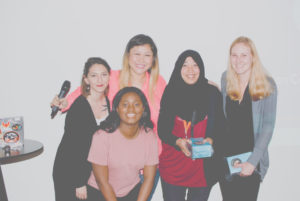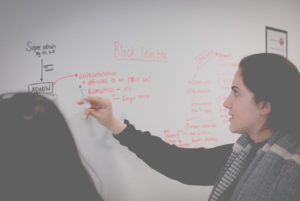Three days of intense hacking, over fifty participants, seven outstanding judges, nine workable ideas and only two of them selected to win during the Techfugees GirlsCanCode Hackathon to create a more inclusive social environment for refugee women and children to thrive in.
How can we facilitate social inclusion and integration of displaced people using technology, whilst respecting various cultural norms of origin countries? How can we promote continuous learning, employment opportunities and empowerment avenues for female refugees? How can we ensure that refugee children are provided with the most conducive environment for them to learn and grow? These are three challenges that GirlsCanCode Hack (#GCCHack) attempted to address.
Over 50 software developers, UI/UX specialists, marketers, web designers, charity workers and refugees participated in the hack. The event consisted of two streams: one for university students and one for advanced hackers in industry. And even though the event was organised in collaboration with GirlsCanCode movement, ‘male allies’ were also welcomed to come along and participate.

Participants were offered an opportunity to sharpen their tech skills, harness IBM’s own AI (Watson), get hands-on coaching from recognized distinguished software engineers from NatWest and IBM and, for future social entrepreneurs, support in developing their ideas into a viable refugee aid project provided by Techfugees London team.
In addition to NatWest, Techfugees London and IBM, the hackathon was also supported by Accenture that provided the food, SapientRazorfish that hosted it in its beautiful and cozy office right in the heart of the city, and FriendlyFires that was advising teams on impact assessment on the day.

First day started with a short introduction by the organisers, GCC team at NatWest Markets and Techfugees London. Then our amazing mentor Lara Khalaf, a Syrian woman and a successful entrepreneur, gave an inspiring talk about her experience of arriving in the UK without speaking the language, through to becoming a Leadership Coach and finding herself in a fascinating socio-cultural juxtaposition with Syrian refugee men that are now reaching out to her for help.
Quickly after that, the audience broke into groups and nine teams were gradually formed to work on various solutions from language support and digital identity to integration into the host community through local events and casual afternoon tea. One of the teams even traveled from Belgium to participate in the hackathon!
Participants
- Thrive
- Block Identity (Runner Up)
- Connie
- Exchangee (Winner)
- Speak2Me
- Nemo
- Wobot
- Cuppa
- Immigr8
As it turned out after first two days of intense hacking and coaching, the majority of teams have decided to go with Watson’s AI-powered chatbot API, the support in the integration of which was kindly provided by IBM tech mentoring team. It was fascinating to see how many different applications this technology may have based on the various circumstance and needs of the displaced.
On Sunday afternoon contestants faced an impressive judging panel comprised of successful business founders, female coders, a portfolio board director and our Trustee Min Teo.
Judges
- Gen Ashley – Director, Women Who Code
- Ghela Boskovich – Founder, FemTech Global
- Raj Ramanandi – Founding Partner, FriendlyFires
- Sencan Sengul – Executive IT Architect, IBM Watson Business Services
- Min Teo – Head of Techfugees London
- Wincie Wong – Digital Propositions Lead, Personal & Business Banking, Royal Bank of Scotland
- Shefaly Yogendra – Portfolio Board Director
Winners & Prizes
Team “Exchangee” won the first prize, conquering a spot in Entrepreneurial Spark business incubator powered by NatWest. Using the Watson API, they built a scoring algorithm to encourage comparability and remove bias between global universities and companies. For instance, an applying candidate went to a school the name of which a hiring manager might not be familiar with, but that is actually the equivalent of Harvard in Indonesia, or worked at Go Jek, which is the analog of Uber there. Having this data will encourage companies to make well informed and fair decisions and hire people from more diverse backgrounds. This can be applied not only for the social inclusion of refugees, but of other migrants alike.




A Runner up prize and IBM Raspberry Pi builder kits were awarded to Team “Block Identity”. These guys came up with a blockchain solution for registering and securely storing birth certificates, an app with two-step Biometric authentication through the fingerprint and iris scan. Block Identity is trying to tackle a serious issue of statelessness among children who have grown up having no identity, no access to health or education.
Honourable mentions were given to teams “Cuppa” and “Connie”. Connie introduced a personal mentor chatbot powered by Watson’s that through conversation and scraping data from social profiles can recommend community based learning courses to refugees and matches them with sponsors who would fund these courses.
Cuppa presented a matchmaking chatbot that facilitates in person meetups over tea in local communities. Starting their presentation team Cuppa stated that the hack for them didn’t end there, they are already in conversations with Facebook and pretty much ready to start testing it on the ground. Their aim is to successfully partner 150 Manchester-based refugee women with women in their local communities. They are also looking for ways to partner with FMCG companies like Unilever to provide tea and local coffee shops to provide safe spaces for their meetups.
All the teams received the just released Amazon Echo (2nd generation) powered by IBM Watson.
–||–
Techfugees was thrilled to partner with NatWest, IBM Watson, Accenture, Sapient razorfish and FriendlyFires to make this amazing competition of innovative ideas for the social benefit a reality, and hats down to the GirlsCanCode team from NatWest RBS headed by Burcu Karabork and Wincie Wong who steered the organisation committee and made it happen.
Congratulations to the winning teams: Exchangee and Block Identity!
You can find photos and videos from #GCCHack here (link). Make sure to also check our Facebook group and Twitter account for the latest news and updates.
